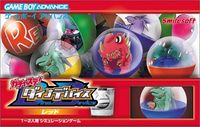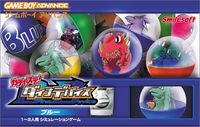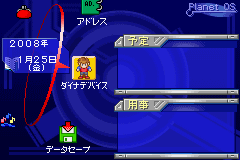Dino Device 1: Difference between revisions
m (Fixed text error.) |
m (Text replacement - "japname" to "ja") |
||
| (5 intermediate revisions by 2 users not shown) | |||
| Line 1: | Line 1: | ||
{{Infobox game | {{Infobox game | ||
| name= | | name=GachaSta! Dino Device | ||
| | | ja=ガチャステ!ダイナデバイス | ||
| romaji = Gachasute! Daina Debaisu | | romaji = Gachasute! Daina Debaisu | ||
| series = Dino Device | | series = Dino Device | ||
| Line 10: | Line 10: | ||
| image2 = [[Image:Dino Device Blue version.jpg|200px]] | | image2 = [[Image:Dino Device Blue version.jpg|200px]] | ||
| release-date = July 6, 2002 | | release-date = July 6, 2002 | ||
| developer = Smilesoft | | developer = A.I | ||
| publisher = Smilesoft | |||
| platform = Game Boy Advance | | platform = Game Boy Advance | ||
| genre = Console role-playing game}} | | genre = Console role-playing game}} | ||
''' | '''GachaSta! Dino Device''' {{lang|ja=ガチャステ!ダイナデバイス|romaji=Gachasute! Daina Debaisu}}, usually shortened as '''Dino Device 1''' or '''DD1''', is a Japanese monster-raising {{w|role-playing game}} (RPG) developed by [[Smilesoft]]. It was released on July 6, 2002 for the {{w|Game Boy Advance}}. While mainly a strategic RPG, the game also includes many useful features such as an organizer, a calculator, and a journal. | ||
In late 2003, a sequel was released by [[Rocket Company]] titled [[Dino Device 2| | In late 2003, a sequel was released by [[Rocket Company]] titled [[Dino Device 2|GachaSta! Dino Device 2]]. | ||
==Gameplay== | ==Gameplay== | ||
| Line 50: | Line 51: | ||
[[Image:DD1-Calculator-icon.gif]] '''Calculator''': A simple calculator. | [[Image:DD1-Calculator-icon.gif]] '''Calculator''': A simple calculator. | ||
[[Image:DD1-Schedule-icon.gif]] '''Schedule''': A | [[Image:DD1-Schedule-icon.gif]] '''Schedule''': A calendar for recording important dates on. | ||
[[Image:DD1-Timetable-icon.gif]] '''Timetable''': A day planner for tracking class timetables for school. | [[Image:DD1-Timetable-icon.gif]] '''Timetable''': A day planner for tracking class timetables for school. | ||
| Line 57: | Line 58: | ||
==Obtaining Dinos== | ==Obtaining Dinos== | ||
[[Dino|Dinos]] are obtained in the game through the [[ | [[Dino|Dinos]] are obtained in the game through the [[GachaSta]] machine found in the Dino Center. Basically a high-tech gashapon machine, the GachaSta (short for Gacha Station) produces Dinos from profiles you have added to the Dino Pad's address book. Dinos are catagorized into 30 different [[styles]], and then further with 5 different [[attributes]] for each style, totalling to 150 different Dinos. The same profile will always produce the same style of Dino, but the attribute of the Dino will always be random. | ||
==See also== | ==See also== | ||
* [[Dino|Dinos]] | * [[Dino|Dinos]] | ||
* [[Dino Device 2]] | * [[Dino Device 2]] | ||
[[Category:Dino Device]] | |||
Latest revision as of 13:00, 17 March 2018
| GachaSta! Dino Device ガチャステ!ダイナデバイス Gachasute! Daina Debaisu | |
  
| |
| Series | GachaSta! Dino Device |
|---|---|
| Versions | Red and Blue |
| Developer(s) | A.I |
| Publisher(s) | Smilesoft |
| Release date | July 6, 2002 |
| Genre | Console role-playing game |
| Platform | Game Boy Advance |
GachaSta! Dino Device (Japanese: ガチャステ!ダイナデバイス, Gachasute! Daina Debaisu), usually shortened as Dino Device 1 or DD1, is a Japanese monster-raising role-playing game (RPG) developed by Smilesoft. It was released on July 6, 2002 for the Game Boy Advance. While mainly a strategic RPG, the game also includes many useful features such as an organizer, a calculator, and a journal.
In late 2003, a sequel was released by Rocket Company titled GachaSta! Dino Device 2.
Gameplay[edit]
The game takes place in Dino City, a virtual city where monsters known as Dinos can live. As the player, you are given the responsibility of creating Dinos and building places for them to live in the city. You can also use your Dinos to battle against other humans' Dinos through a system known as Dino Net. Battles take place on a virtual grid where both teams cannot see the other until they choose to attack. The battle system is quite different from other RPGs in this sense, with strategic elements resembling Battleship and Minesweeper. For battling, Dinos are capable of equipping specialized weapons and armor known as Devices. Devices boost a Dino's stats in battle and also give them a special attack, effectively allowing the player to customize the Dino's strengths and moveset.
Dino Pad[edit]

The Dino Pad is the fictional PDA-like device that works as the overall menu for Dino Device. The Dino Pad menu is brought up every time you start the game, and can also be accessed from inside Dino Device by selecting the "end game" option on the system menu. The Dino Pad has many features for keeping yourself organized, as well as minigames, a sound test, and the address book used for generating Dinos. The main game, Dino Device is also accessed from this menu. If the player chooses to return to the menu from Dino Device, the game will remain paused until the player accesses the game again.
Features[edit]
When the game is turned on, it asks for the current date. It then gives a Horoscope that rates how lucky the day will be in Health, Study and Money, as well as a "Lucky Dino".
The main features include:
![]() Dino Device: Launch the main Dino Device game.
Dino Device: Launch the main Dino Device game.
![]() Data Save: Save all progress and changes in the games and features.
Data Save: Save all progress and changes in the games and features.
![]() Communication: Use a link cable to trade Dinos, Devices or Addresses, and battle Dinos.
Communication: Use a link cable to trade Dinos, Devices or Addresses, and battle Dinos.
![]() Minigame 1: A simplistic scrolling shooter game. The player pilots a Cygnus Dino to dodge bullets and shoot targets and enemies. There are two bosses to defeat. In-game money can be earned by winning.
Minigame 1: A simplistic scrolling shooter game. The player pilots a Cygnus Dino to dodge bullets and shoot targets and enemies. There are two bosses to defeat. In-game money can be earned by winning.
![]() Minigame 2: A game similar to Minesweeper. There are three levels of difficulty, with the higher ones having much larger grids and many more bombs to avoid. In-game money can be earned by winning.
Minigame 2: A game similar to Minesweeper. There are three levels of difficulty, with the higher ones having much larger grids and many more bombs to avoid. In-game money can be earned by winning.
![]() Minigame 3: A game where the player feeds hungry Dinos. There are four Dinos on the screen who request either meat, fish or fruit. The player must pick up the correct food and place it on their plates before they get angry. Taking too long ends the game. In-game money is earned depending on score.
Minigame 3: A game where the player feeds hungry Dinos. There are four Dinos on the screen who request either meat, fish or fruit. The player must pick up the correct food and place it on their plates before they get angry. Taking too long ends the game. In-game money is earned depending on score.
![]() Music: Listen to all the music from the game, accompanied by visual effects.
Music: Listen to all the music from the game, accompanied by visual effects.
![]() Memo: A memo pad to write notes on.
Memo: A memo pad to write notes on.
![]() Pocket Money: An organizer designed to keep track of money spent and earned over time.
Pocket Money: An organizer designed to keep track of money spent and earned over time.
![]() Calculator: A simple calculator.
Calculator: A simple calculator.
![]() Schedule: A calendar for recording important dates on.
Schedule: A calendar for recording important dates on.
![]() Timetable: A day planner for tracking class timetables for school.
Timetable: A day planner for tracking class timetables for school.
![]() Address Book: A place to record profiles and contact information. Profiles are used to generate Dinos, and names from the Address Book appear in the game as opponents. Each profile contains information such as name, nickname, gender, birth date, address, phone number and blood type.
Address Book: A place to record profiles and contact information. Profiles are used to generate Dinos, and names from the Address Book appear in the game as opponents. Each profile contains information such as name, nickname, gender, birth date, address, phone number and blood type.
Obtaining Dinos[edit]
Dinos are obtained in the game through the GachaSta machine found in the Dino Center. Basically a high-tech gashapon machine, the GachaSta (short for Gacha Station) produces Dinos from profiles you have added to the Dino Pad's address book. Dinos are catagorized into 30 different styles, and then further with 5 different attributes for each style, totalling to 150 different Dinos. The same profile will always produce the same style of Dino, but the attribute of the Dino will always be random.